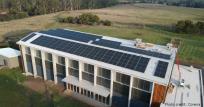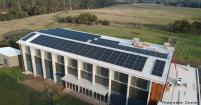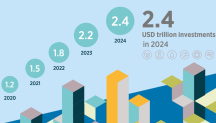

Empowering Communities to Reap the Multiple Benefits of Renewable Energy
Newsletter
The participation and ownership by citizens or members of a defined community in a renewable energy project creates local socio-economic value and helps foster more positive attitudes towards renewables. This, in turn, increases citizen support for the energy transition, which further contributes to accelerating a just and inclusive transition. In this regard, the IRENA Coalition for Action analyses 11 renewable energy initiatives from across the world, showcasing best practices and the various socio-economic impacts to societies.
In some communities, the increased access to energy simply means longer hours to conduct more activities, which leads to more productivity that generates additional income. In Timor-Leste, the electricity produced from the Village Lighting Scheme’s solar home system has enabled communities to undertake night-time economic activities, by repairing fishing nets and weaving fabric at night.
In Canada’s 3NE solar farm project, the decision-making process that engages all stakeholders in the indigenous nations improved the community’s energy literacy. This enabled them to manage the project well under budget and to invest in other sustainability initiatives targeting food security and energy sovereignty. The Nations were further able to convert wood salvaged from the solar farm into stock and create a now-thriving wood-fuel business that provides additional income to the three Nations.
Increased access to water brought about by the AfrikaSTARK 1 project of community solar-powered irrigation has increased agricultural productivity and supported the municipality of Blendio’s (Mali) response to COVID-19. The electricity generated by this Malian-German partnership also helps local women carry out their main activity of vegetable gardening. Harvesting and economic activities in the village have increased and livelihoods improved.
Similar impact is shown in Nigeria. The solar PV mini-grids installed by the Sosai Renewable Energies project in two villages in northern Nigeria enabled solar dryers to be installed for local farmers to process their produce. Around 30 women farmers from both communities are trained in handling produce, drying produce, in hygiene standards, and packaging. All of these skills are transferable to other professional endeavours that would benefit these women in improving their livelihoods.
Sosai Renewable Energies also contribute to local job creation by employing local staff in the communities to monitor solar photovoltaics (PV) mini-grids and ensure that households and businesses are paying for the energy services on time. The initiative trained these staff in record keeping and basic troubleshooting, and provided them with a monthly base pay as well as a percentage of all funds collected from the payment of energy services.
Job creation is also one of the socio-economic benefits generated by Enercoop, France’s largest co-operative renewable energy supplier that seeks to decentralise its organisation as much as possible to deal with energy issues on a local level. With the growth of its network across France, it is now able to employ 235 people and to diversify its activities to bring more benefits to communities, through a solidarity fund that finances energy poverty alleviation projects. Meanwhile, within the largest renewable energy cooperative in Spain, Som Energia, local groups can even launch their own complementary initiatives.
In Japan’s Hotoku Energy and Shonan Power community energy partnership, the benefits are extended to social causes in the community. Shonan Power’s customers are contributing 1% of their bills to support community initiatives. This contribution is used for the revitalisation of local industries, environmental activities, disaster prevention efforts, culture and arts, as well as the provision of meals for children in need.
Social causes are also supported by the Tulila Hydroelectric Plant, a community energy project that supplies reliable hydropower in rural Tanzania. A portion of the revenues earned by selling electricity to the national utility is used to support charity work, which includes delivering education for 2 000 pupils, nutrition and orphanage services, and operating the only health-care facility in the Chipole area.
In some of the renewable energy projects analysed by the Coalition, the benefits are extended outside the community. In Mainz, Germany, the regional solar PV systems constructed by UrStrom eG citizen energy co-operative also supply 100% green electricity to an e-car sharing programme. The e-car programme is now leading a transport revolution that helped establish national and European organisations focused on e-mobility.
Similar amplified benefits can be seen in Citizens Own Renewable Energy Network Australia (CORENA). The initiative has expanded beyond renewable energy to electric vehicle (EV) projects. CORENA has also been able to advise groups in establishing their own revolving funds to support renewables.
All of the initiatives analysed in the Coalition’s paper highlight the importance of direct engagement in decision-making and financing. The different local contexts within which community energy initiatives are deployed also provide important lessons learned. In the case of Suriname’s Waterpower station Bëkyooköndë & Duwata, integrating local practices into governance structures, adapting financial practices to local infrastructure challenges, and considering the availability of local components contribute to the success of the community hydropower project.
Read the full Community Energy Toolkit: Best Practices for Broadening the Ownership of Renewables.




